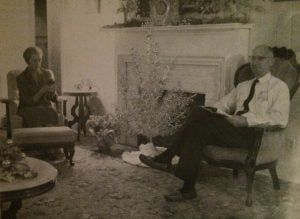Suffering In Silence

The arrangement conference had not gone smoothly, to say the least. The sole family member present had been polite enough, but the funeral director felt like he didn’t trust her ability. Maybe it was because she was young or because she was a she or just because, but for whatever reason, it had not been a pleasant experience for her and she feared he might feel the same.
There were several days between the conference and the burial, several which became a few more due to the prediction of rain on the originally chosen date. Anytime he came in the office there was this tension that filled the air, a condition to which we are not accustomed. Most all the families we serve trust us or grow to as we move through the process, but we didn’t feel that from him. He was always so stern, so business-like and abrupt in his manner. Perhaps that was just his nature, but occasionally there would be a faint smile or an attempt at humor, neither of which lasted very long.
The day of the service a few members of the immediate family arrived at the funeral home for their private viewing. Then the casket was placed in the hearse and the family filed to their cars, ready for the drive to the cemetery where the service would be held. There would be one speaker, no music, and a handful in attendance, but that seemed to be what he wanted. Throughout the service he stared straight ahead, no sign of emotion—almost as though he really wasn’t present—but the director thought she perceived the slightest hint of an internal struggle. The service drew to a close and the director dismissed everyone but, as they prepared to leave, he spoke. “My dad really liked this song and I’d like to play it for him.” And with that he touched the screen of his cell phone then laid it face down on the casket. As everyone stood quietly, the strains of an orchestra filled the cemetery and Lisbeth Scott began to sing Here’s to You.
“Rest forever here in our hearts. The last and final moment is yours . . .”
And as she sang he wept bitterly. When the music faded and the cemetery was once again shrouded in silence, he turned and thanked everyone for coming. He shook the directors’ hands and thanked them for their help. Despite the somberness of the day, his burden now seemed lighter.
She shared the story with me when they returned and I finally understood. It wasn’t anger or a lack of trust or some personality flaw we had observed in the days preceding the service. It was grief, pure and simple. It was an unwillingness to allow anyone to see his pain, so he hid behind a gruff exterior, slowly building a protective wall with each conversation and decision. Only when it came time to bid his final farewell did the pain grow greater than his need to hide it.
Often those who are trying to cope with loss believe they have to “be strong”—strong for other family members, strong so the world doesn’t watch them, strong because it’s been “long enough” or so others don’t feel uncomfortable in their presence. And sadly, those “others” often encourage them to do just that, but hiding our pain doesn’t make it go away. If anything, it just makes it more intense. So maybe, instead of encouraging those who are suffering to suffer in silence, we should give them permission to openly grieve . . . but that only works if they have given themselves permission first.
The post Suffering In Silence appeared first on Shackelford Funeral Directors | Blog.












